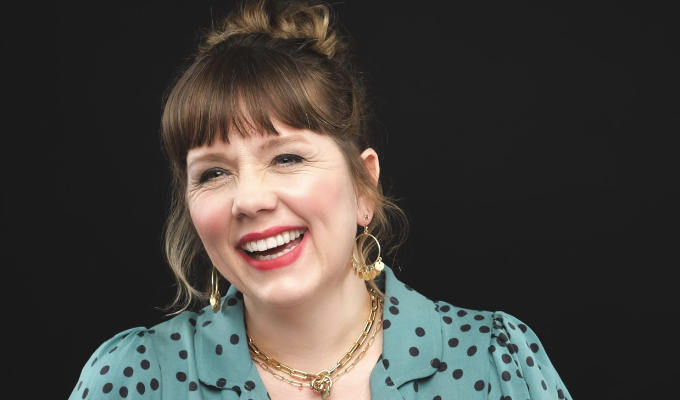
It's like 24 – with laughs
Steve Pemberton on Psychoville
Reece and I got together two years ago to write this, after League Of Gentlemen had come to a stop.
We did an awful lot with the Royston Vasey characters. It was ten years ago it was first on TV, and before that we’d been doing four or five years live or on radio. It came to a natural stop. We’d done the movie, we’d done two big tours, we’d done three series.
I think we thought that if we carried on with these characters we’d be repeating ourselves, and we never wanted to be one of those shows where you felt you’d seen it all before. If some people didn’t like the third series so much, or didn’t like the film quite so much, you can’t argue that it didn’t try to do something different.
So we reached a point where we, particularly Mark [Gatis], wanted to do other things. He had his fingers in Doctor Who and stuff like that, and he definitely said he wanted to have a break. And the BBC never came knocking our door down saying, ‘Please can we have another series’. Nor did they say, ‘Can you write a new show for us?’
Reece and I just booked an office and started to write on spec, we didn’t tell anyone what we were doing and we came up with some characters and something that was a comedy, but mixed in with a thriller or a mystery
We had to go through the same process as everyone else, of submitting a script, then getting a second one commissioned, and then doing a table read and all that sort of stuff. It certainly wasn’t carte blanche, to do what we wanted.
I don’t begrudge doing that kind of thing because you should have to prove yourself, it shouldn’t be so easy to get on to TV because that’s where laziness kicks in. We were very thorough with the scripts; we worked very hard on them and the characters and when we did the read-through we cast it and we staged it the best we could, and all that helps the end product.
Psychoville was born out of shows we love – Lost is a good example – where you just want to see the next episode, you’re just dying to know what happens next. For me, that sort of serial element was really important.
You don’t get a lot of that sort of thing, full stop – let alone in comedy. So we thought it would be great if you could do a ‘24 with laughs’. Something that really drew you into a story. The show begins with five people receiving this letter saying, ‘I know what you did’ and over seven episodes we find out what they did do, and how they know each other.
There’s one character I play called Mr Lomax, an old blind man. I read for a blind man when I was a student so I thought that was a very interesting relationship. And you know when you’re a kid there’s always a Dickensian house that if you kick your ball over the fence you’re scared to go in because of all the stories about who lives there. So I put those two ideas together to create this character. Reece had this friend who’s dad was quite an eccentric old man, and if you went into his house and opened a door or a drawer where you weren’t supposed to be, he’d say, ‘Get your claw out of my holy of holies’ and we just thought that was a great opening line, so we put all that together.
Very often you’ll get a laugh from undercutting the tension. We’re all attuned to the clichés of the thriller/mystery genre, so you can have a bit of fun with it in terms of playing with those clichés. But we wanted some bits to be genuinely creepy, and frightening and evocative – and maybe we sacrifice some laughs for that, but in my mind that’s a sacrifice worth making because you end up with something that’s much richer.
People who have seen Psychoville say they really want to know what happens next. Too many comedy shows rely on presenting you with the same formula, the same format, week in week out. Of course the TV stations love that because they can show them in any order, you can watch one episode without seeing the rest and it’s a lot easier to sell.
But that’s not the kind of thing we’re into as viewers and as writers so what we’ve done is something for like-minded people. Hopefully there’s enough of them out of there. The viewer has to put a bit of work in, I’m afraid.
It was an ambitious shoot, with multiple locations and multiple characters. There’s one special episode, the fourth one, that just deals with two characters David and Maureen, mother and son. We shot that in two takes. We wanted to do in it one, but the camera’s dolly didn’t have enough gas in it to keep jigging up and down. It was based on Hitchcock’s Rope, which was shot in really long takes
It was a budgetary thing. We were asked if we could come up with something that was a lot cheaper to shoot so we could spend the budget elsewhere. It was a writing challenge. ‘Can you come up with a half hour that delivers great comedy and great tension and mystery and thrills in one room with three characters?’ We’re really proud of it.
It’s like not blinking. A lot of people will watch it and not realise it was done in one take A lot of things had to be done to facilitate that – chairs had to be moved out the way then put back again so they weren’t missing from the shot. It was a like a big ballet between us – the actors – and the crew.
There’s something about not cutting that adds to the tension. Not to mention the tension you feel when you ‘re acting it, knowing that if you make one tiny mistake, even just a small fluff, then that’s it. The whole previous 18 minutes of perfect filming is rendered unusable. I think we did about 20 takes and we used take 16.
Two days we took to film that. That’s the future of television: one full half-hour in just two days, I’m sure it’ll be held up as an example by BBC bosses.
We worked with a different set of people on this, as a rule, than we did on the League of Gentlemen. That was a deliberate decision; we wanted to keep the comparisons to a minimum. We had the same costume designer and same composer. Apart from that we had a new director and a new cinematographer and a new set designer and they were all very keen that this show looked as good as – if not better than – League Of Gentlemen, and I think they’ve done a fantastic job And in our writing we’re always aware of the visuals. It’s never just the dialogue. The visuals are such a big part of it.
Of course there are going to be comparisons with the League Of Gentlemen. I don’t mind that, really, because we’re really proud of that show, it’s not like we’re trying to distance ourselves from it. It’s not for me to say how it compares, really. Psychoville is probably more mature. All I can say is I’m, absolutely delighted and thrilled with the way it turned out. It feels like its own show, which is the most important thing.
The League Of Gentlemen had to take on more of a sketch feel because you were incorporating characters and storylines that were written by somebody else, and you could never have that driving through line that Psychoville has with only two of us writing it.
Both Mark and Jeremy can’t wait to see Psychoville. The friendship is absolutely still there as is the will to collaborate again. Whether we will ever do anything again, I honestly can’t say, but we’re all very good friends still.
Because Psychoville has this mystery element, we started talking about expanding this world. We’ve created some websites, giving each of the characters their web pages – and there’s some very funny stuff on those pages, but you have to find the websites yourself. You’re not spoonfed the answer, you have to do your research. There are URLs visible in the show if you pause it. We thought it was quite innovative. It was an exciting opportunity to use the internet.
A lot of interactive content isn’t actually written by the people who did the series and it doesn’t feel right for the programme, but all these websites, we’ve written ourselves.
My hope is that Psychoville might get recommissioned. With something like a mystery, you have to answer some of the questions. We haven’t done a Lost where you leave people completely stranded (a) because we don’t know whether we’ve got another series or not, and (b) it does feel like a cheat after a while not to have any answers.
But there is a sense that another chapter could begin. We’ve put a little thing in at the end that could lead into a second series. We’d love to do it. We’re really proud of it and we had a lot of fun making it and I really don’t think there’s anything else like it out there. I’m really hoping it’s a success. I’m hoping people will watch it and not Big Brother, that other set of freaks.
Steve Pemberton was speaking to Steve Bennett
Published: 18 Jun 2009






